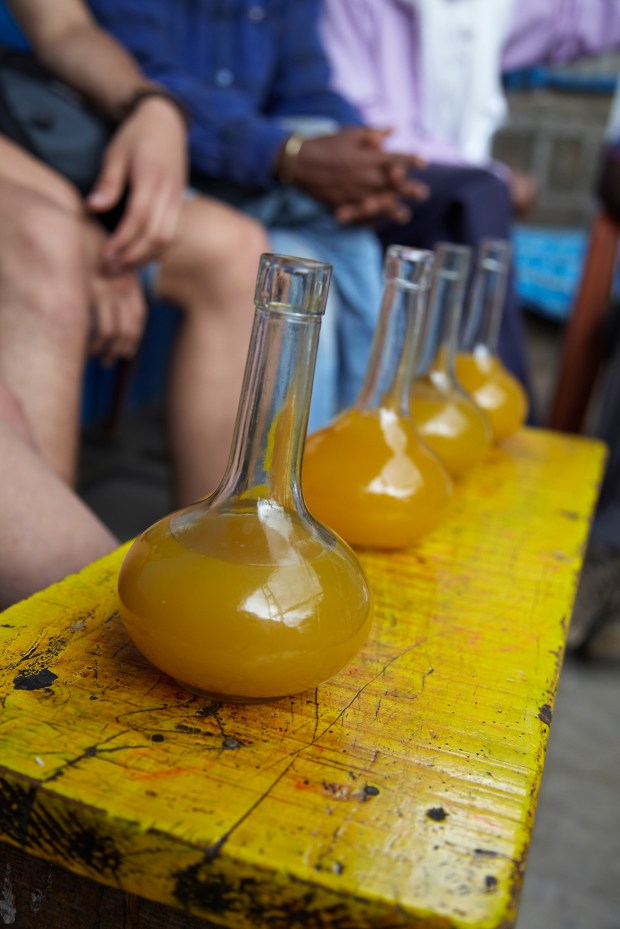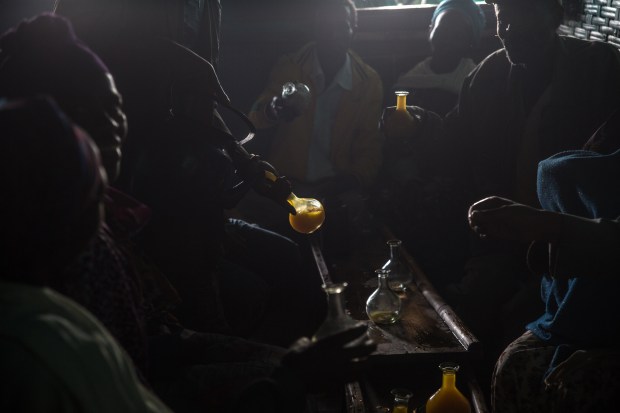Tej bets, or honey-wine houses, look modest and unassuming from the outside, but these gathering spaces are central tenets of Ethiopian life. Neighbors come here to catch up on local gossip and relax over glasses of mead, or honey wine.
The smells and sounds of these neighborhood bars are unmistakable: The sickly-sweet scent of Ethiopia’s deep-orange national drink fills the room over sounds of masinko-wielding azmaris, minstrels who play the fiddle and sing of legendary figures and tease customers with lyrics full of double entendres. Patrons talk folklore and history, weaving proverbs and scripture into the conversation. Most tej bet owners are women, and most of the patrons are men—even today many Ethiopians frown upon women going to bars.
In the 19th century, honey wine was the prized drink of Ethiopian nobility and soldiers. Made of water, honey, and gesho leaves (an indigenous plant used as hops), the drink is typically served in a stainless-steel kettle and drunk from small glasses with narrow necks that look like beakers taken from a laboratory.

There’s an old Amharic saying: Tej for the nobles and a cabbage for the poor. Ethiopians in remote villages used to drink tella, a home-brewed beer, which is still common at festivals and celebrations.
But today tej and tej bets are for everyone.
Most tej bets have cheeky names, sometimes coined by customers who’ve had a few glasses. In Addis Ababa, there’s Gedel Gibu Tej Bet (literally, “Go to Hell”) and Wond Yikmesish Tej Bet. There’s even an Obama Tej Bet, named after the former U.S. president.
The holy town of Lalibela in the north is known for its tej bets, including my favorite: Kassach Tej Bet. While establishments that cater to tourists are overpriced and ostentatiously decorated, Kassach remains a simple gathering place that embraces the landscape—it sits amid a sea of tukuls, or round mud huts, in a residential compound.
Owner Woizero Kassach wears a traditional dress called a kemis, along with a white netela shawl, and makes her tej with wildflower honey harvested by local beekeepers. Lalibela is renowned for its rich and waxy white honey (the village name means “honey eater” in Amharic). Kassach adds ingredients like sorghum, maize, fennel, and coffee to flavor the wine.
Nearby, Torpedo Tej Bet draws tourists from around the world but remains popular with locals as well. Guests snack on roasted kolo, which resembles unopened popcorn, and kita, thin spiced bread. Torpedo’s tej is known for its mild, delicate flavor and happens also to be popular with Ethiopian Orthodox priests, who often visit. They can be spotted sipping from flasks of tej while dressed in their heavy ceremonial robes, impressive crucifixes draped around their necks.
